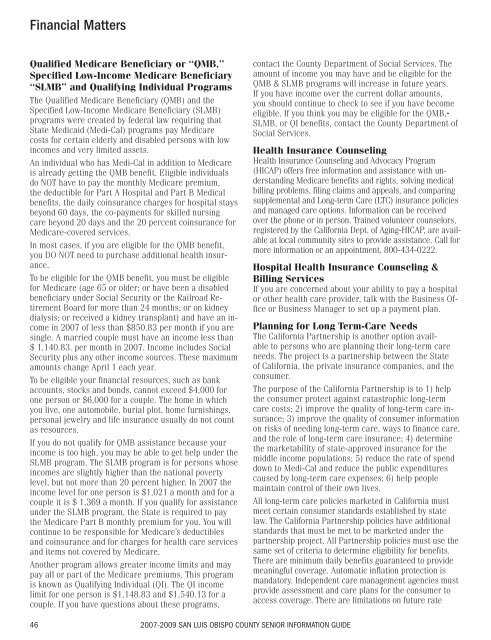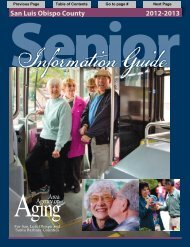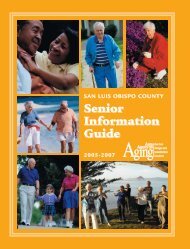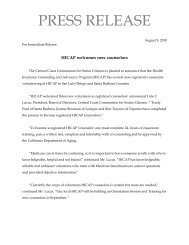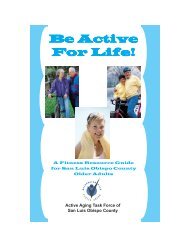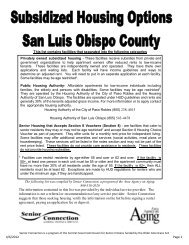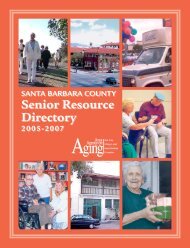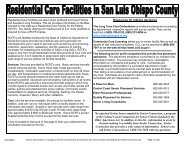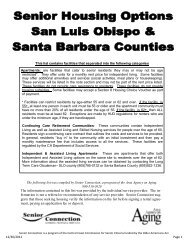SAN LUIS OBISPO COUNTY Senior Information Guide
SAN LUIS OBISPO COUNTY Senior Information Guide
SAN LUIS OBISPO COUNTY Senior Information Guide
You also want an ePaper? Increase the reach of your titles
YUMPU automatically turns print PDFs into web optimized ePapers that Google loves.
Financial Matters<br />
Qualifi ed Medicare Benefi ciary or “QMB,”<br />
Specifi ed Low-Income Medicare Benefi ciary<br />
“SLMB” and Qualifying Individual Programs<br />
The Qualifi ed Medicare Benefi ciary (QMB) and the<br />
Specifi ed Low-Income Medicare Benefi ciary (SLMB)<br />
programs were created by federal law requiring that<br />
State Medicaid (Medi-Cal) programs pay Medicare<br />
costs for certain elderly and disabled persons with low<br />
incomes and very limited assets.<br />
An individual who has Medi-Cal in addition to Medicare<br />
is already getting the QMB benefi t. Eligible individuals<br />
do NOT have to pay the monthly Medicare premium,<br />
the deductible for Part A Hospital and Part B Medical<br />
benefi ts, the daily coinsurance charges for hospital stays<br />
beyond 60 days, the co-payments for skilled nursing<br />
care beyond 20 days and the 20 percent coinsurance for<br />
Medicare-covered services.<br />
In most cases, if you are eligible for the QMB benefi t,<br />
you DO NOT need to purchase additional health insurance.<br />
To be eligible for the QMB benefi t, you must be eligible<br />
for Medicare (age 65 or older; or have been a disabled<br />
benefi ciary under Social Security or the Railroad Retirement<br />
Board for more than 24 months; or on kidney<br />
dialysis; or received a kidney transplant) and have an income<br />
in 2007 of less than $850.83 per month if you are<br />
single. A married couple must have an income less than<br />
$ 1,140.83. per month in 2007. Income includes Social<br />
Security plus any other income sources. These maximum<br />
amounts change April 1 each year.<br />
To be eligible your fi nancial resources, such as bank<br />
accounts, stocks and bonds, cannot exceed $4,000 for<br />
one person or $6,000 for a couple. The home in which<br />
you live, one automobile, burial plot, home furnishings,<br />
personal jewelry and life insurance usually do not count<br />
as resources.<br />
If you do not qualify for QMB assistance because your<br />
income is too high, you may be able to get help under the<br />
SLMB program. The SLMB program is for persons whose<br />
incomes are slightly higher than the national poverty<br />
level, but not more than 20 percent higher. In 2007 the<br />
income level for one person is $1,021 a month and for a<br />
couple it is $ 1,369 a month. If you qualify for assistance<br />
under the SLMB program, the State is required to pay<br />
the Medicare Part B monthly premium for you. You will<br />
continue to be responsible for Medicare’s deductibles<br />
and coinsurance and for charges for health care services<br />
and items not covered by Medicare.<br />
Another program allows greater income limits and may<br />
pay all or part of the Medicare premiums. This program<br />
is known as Qualifying Individual (QI). The QI income<br />
limit for one person is $1,148.83 and $1,540.13 for a<br />
couple. If you have questions about these programs,<br />
46 2007-2009 <strong>SAN</strong> <strong>LUIS</strong> <strong>OBISPO</strong> <strong>COUNTY</strong> SENIOR INFORMATION GUIDE<br />
contact the County Department of Social Services. The<br />
amount of income you may have and be eligible for the<br />
QMB & SLMB programs will increase in future years.<br />
If you have income over the current dollar amounts,<br />
you should continue to check to see if you have become<br />
eligible. If you think you may be eligible for the QMB,<br />
SLMB, or QI benefi ts, contact the County Department of<br />
Social Services.<br />
Health Insurance Counseling<br />
Health Insurance Counseling and Advocacy Program<br />
(HICAP) offers free information and assistance with understanding<br />
Medicare benefi ts and rights, solving medical<br />
billing problems, fi ling claims and appeals, and comparing<br />
supplemental and Long-term Care (LTC) insurance policies<br />
and managed care options. <strong>Information</strong> can be received<br />
over the phone or in person. Trained volunteer counselors,<br />
registered by the California Dept. of Aging-HICAP, are available<br />
at local community sites to provide assistance. Call for<br />
more information or an appointment, 800-434-0222.<br />
Hospital Health Insurance Counseling &<br />
Billing Services<br />
If you are concerned about your ability to pay a hospital<br />
or other health care provider, talk with the Business Offi<br />
ce or Business Manager to set up a payment plan.<br />
Planning for Long Term-Care Needs<br />
The California Partnership is another option available<br />
to persons who are planning their long-term care<br />
needs. The project is a partnership between the State<br />
of California, the private insurance companies, and the<br />
consumer.<br />
The purpose of the California Partnership is to 1) help<br />
the consumer protect against catastrophic long-term<br />
care costs; 2) improve the quality of long-term care insurance;<br />
3) improve the quality of consumer information<br />
on risks of needing long-term care, ways to fi nance care,<br />
and the role of long-term care insurance; 4) determine<br />
the marketability of state-approved insurance for the<br />
middle income populations; 5) reduce the rate of spend<br />
down to Medi-Cal and reduce the public expenditures<br />
caused by long-term care expenses; 6) help people<br />
maintain control of their own lives.<br />
All long-term care policies marketed in California must<br />
meet certain consumer standards established by state<br />
law. The California Partnership policies have additional<br />
standards that must be met to be marketed under the<br />
partnership project. All Partnership policies must use the<br />
same set of criteria to determine eligibility for benefi ts.<br />
There are minimum daily benefi ts guaranteed to provide<br />
meaningful coverage. Automatic infl ation protection is<br />
mandatory. Independent care management agencies must<br />
provide assessment and care plans for the consumer to<br />
access coverage. There are limitations on future rate


